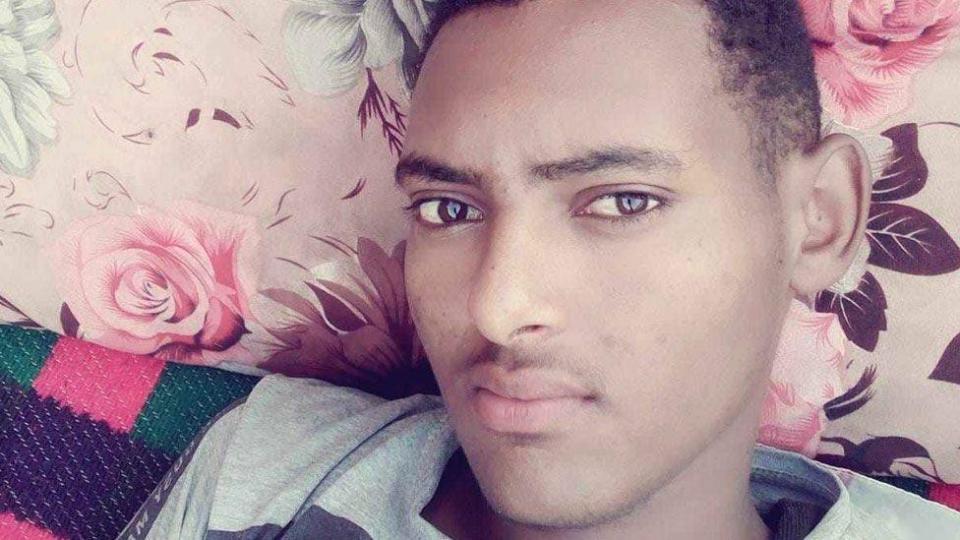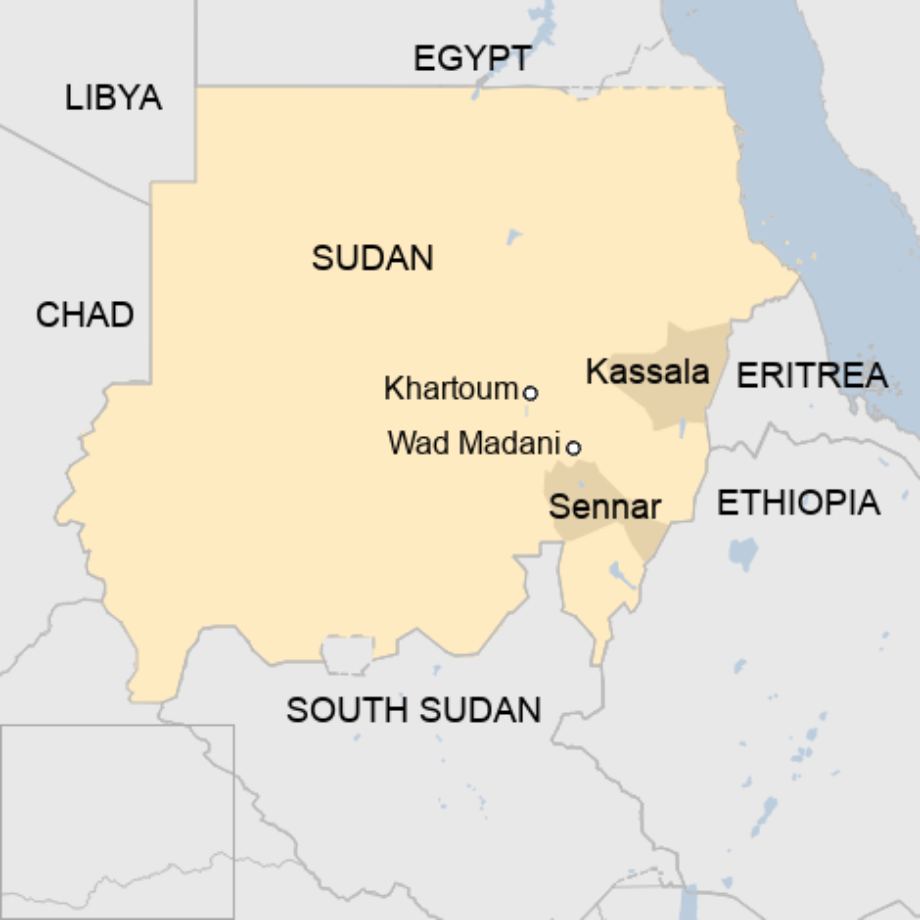Mihret Gebru recently watched with concern two viral videos on her cell phone that showed people from the Horn of Africa being beaten and assaulted by armed men in Sudan – and was then horrified to see her sister among the captives.
“I instantly identified Luwam, who is wearing the orange scarf that I know very well – and his shoes, which can be partially seen,” she told the BBC.
The sisters are from Eritrea – and like many young people, Luwam Gebru fled the country’s indefinite military conscription, which they feel denies them a future.
She ended up in neighboring Ethiopia in 2019, where she had refugee status. But being a refugee can be like living a life in limbo – and many choose to take dangerous journeys in search of new lives and opportunities.
Mihret said his 24-year-old brother decided to risk crossing Sudan’s war zone to reach Libya last year, several months after the conflict began.
Sudan descended into chaos in April 2023, when former allies – the army and the Paramilitary Rapid Support Forces (RSF) – began fighting each other for control of the country.
Many foreign nationals were hastily evacuated – but some refugees already in the country and recently arrived migrants, like Ms. Luwam, were treated with suspicion and taken prisoners of war.
“We didn’t hear her voice for almost a month,” says Mihret.
“She called once from Sudan and told us, ‘Don’t worry, I got to Sudan safely and we can get to Libya this week.’”
Her younger sister seemed confident that the people smugglers she trusted with her life would not let her down.
But nothing was heard from her for another five months – until the videos appeared on social media in April.
Analysis of the images by BBC Verify suggests they were uploaded on April 7 and 8.
A Sudanese army general refers to the approximately 50 detained on board a truck as “mercenaries from Somalia, Eritrea and Ethiopia”.
They appear to have been captured fleeing fierce fighting around the al-Jaily oil refinery, north of the capital, Khartoum, which is in RSF hands and used as a base in the area.
In one of the videos, an army officer says that prisoners are being transferred to the army’s military base in Wadi Seidna, which is also north of the capital.
There have been unsubstantiated reports that foreign fighters are being used by the RSF – which may explain the hostility to the group from army officers.

Photos of the group, including several with Luwam in his orange scarf, show them huddled together in a warehouse room.
Ms Mihret, who was also able to identify one of her Eritrean neighbors in the group, said she was unable to obtain further information.
“We don’t know much, we were told they are in the custody of the Sudanese authorities.”
Other Eritreans told the BBC that they have family members registered as refugees in Sudan who have disappeared and are allegedly being held by the Sudanese military.
Two of them left Eritrea together last year, arriving at a UN-run refugee camp in Kassala state in eastern Sudan in October.
Their families say Yonatan Tesfaslassie, 17, and Edmon Kidane, 20, were then approached by smugglers.
These traffickers, some of whom allegedly belong to the RSF, often target young people and newcomers, promising them a safe route out of Sudan for a fee.
Once on the way, they pressure them to ask their relatives abroad to pay more money and then abandon them on the way.
In the case of Mr. Yonatan and Mr. Edmon, they were targeting South Sudan when it appears they were abandoned by smugglers and were separated.
It appears that both arrived in Wad Madani in Gezira State, a town about 190 kilometers south of Khartoum that had been a safe haven for many since the start of the war.
But in December it was up to RSF troops and more than 300,000 fled the area in the chaos.
That was the last time Mr Yonatan’s family heard from him – when he said he was traveling with other migrants to South Sudan.


His sister Winta Tesfaslassie later heard from those who made it safely across the border that he may have been among many migrants who were detained in the army-controlled town of Rabek, a little further south.
Some of them, they said, were taken to the nearby town of Sinjah and others possibly to the town of Sennar, to be detained by the army.
“The whole family is so worried and we have no idea what to do, we feel helpless. We want to know if he is safe, he is too young to go through such an ordeal and it has nothing to do with the war in Sudan,” Winta, who lives in the UK, told the BBC.
Mr Edmon’s family also last heard from him when he was in Wad Madani – although it appears he was detained in the town several weeks before it fell into the hands of the RSF.
“A smuggler told us he was being held by the Sudanese army,” his sister Adiam Kidane, who lives in Angola, told the BBC.
The smuggler was the only source of information “but then he stopped answering our calls,” she said.


“For a long time we couldn’t tell our mother, but eventually we had to. She fainted the moment she knew we hadn’t heard from him. We are all in danger. We are constantly thinking about what could have happened to him.”
Some reports say that more than 200 migrants of different nationalities were detained at a military facility in Wad Madani before the RSF advance – information that the BBC cannot independently confirm.
It has since been reported that the detainees were transferred with the army as it withdrew from Wad Madani.
The UN refugee agency says it has received similar reports about the army’s detention of asylum seekers and refugees. According to the UN, there are more than 147,000 Eritreans and around 70,000 Ethiopians in the country.
The agency told the BBC it was planning a verification mission to Sennar state, which includes the towns of Sinjah and Rabek, urging relatives of refugees who believe they are being held to report the information. via the UNHCR Sudan help page.
Similarly, the International Committee of the Red Cross (ICRC) said those with a family member missing in Sudan should open a case via your hotline or country offices.
“Helping families who have lost contact with their loved ones locate them is one of our top priorities. But our ability to do this depends on the access we have and the volatile security situation,” the ICRC told the BBC.
Sudan’s embassy in London did not respond to a BBC request for comment on the arrests of foreign nationals.
Despite international efforts to end the fighting, in which more than 15,000 people are thought to have been killed, the warring parties are unable to agree on a ceasefire.
The three sisters who spoke to the BBC about their missing brothers say it is an extremely frustrating process to get any information, whether from the ICRC, the UN or the military.
“Please help us, the UN, anyone… we are desperate,” Winta said.
“We appeal to the Sudanese authorities to please allow them to call us to hear their voices.
“We ask the army to release them, they are innocent young people who left their country in the hope of reaching a safe destination in South Sudan.”


You might also be interested in:


Go to BBCAfrica.com for more news from the African continent.
Follow us on Twitter @BBCAfricaon Facebook at BBC Africa or on Instagram at bbcafrica



































/cdn.vox-cdn.com/uploads/chorus_asset/file/25478660/1838926059.jpg?w=150&resize=150,150&ssl=1)
